Alai Syafina on Founding Demi Gadis and Amplifying Unheard Voices

Ethan Quar
September 25, 2025
Alai Syafina is a youth advocate and policy apprentice whose journey has been marked by resilience, empathy, and a commitment to building platforms for others. From setbacks after graduation to co-founding Demi Gadis and contributing to Brunei’s Ministry of Defence, she has steadily carved out a role where advocacy and policy meet, guided by her belief that empathy should be at the center of change.
Apprentice at Brunei’s Ministry of Defence, working on regional and international relations
Leads the Brunei chapter of ASEAN Youth Advocates Network (AYAN)
Co-founded Demi Gadis, a regional initiative on women’s empowerment supported by UNESCO
Overcame scholarship rejections and post-graduation struggles to find her footing in advocacy
Represented Brunei in regional summits, fellowships, and youth leadership programmes including SSEAYP
At twenty-five, Alai Syafina has found her footing in advocacy and policy. She is currently an apprentice at Brunei’s Ministry of Defence, supporting work on regional and international relations, and she also heads the Brunei chapter of the ASEAN Youth Advocates Network. Alongside this, she is the co-founder of Demi Gadis, a project shaped by collaboration with peers she met at the YSEALI Summit in Bali in 2023. What began as a shared vision among three young women from Brunei, Malaysia, and Indonesia officially launched across all three countries on International Women’s Day 2024, and today it continues under their leadership with support from UNESCO.
Her work reflects a steady thread: creating platforms for others. Whether championing youth initiatives, shaping conversations around gender, or contributing to policy research, Syafina has been guided by one value above all. “My number one value is empathy,” she said. “That is what I try to centre in everything I do.”
Her path, however, has not been without setbacks. From losing out on scholarships and cancelling an exchange to facing unemployment and personal challenges after graduation, Syafina has had to navigate moments of deep uncertainty. Yet each detour sharpened her resolve and brought with it a lesson that might not have been so quickly apparent.
Discovering Her Path: From MUN to IR
The seeds of this journey were planted early. As a teenager, Syafina was the kind of student who joined every club and activity she could, partly out of ambition and partly, as she laughs, “because it was an excuse to escape class.” The turning point came when she discovered the Model United Nations. Suddenly, she was in rooms where world issues were discussed with urgency, and she caught herself thinking, perhaps naively, that she might one day change things.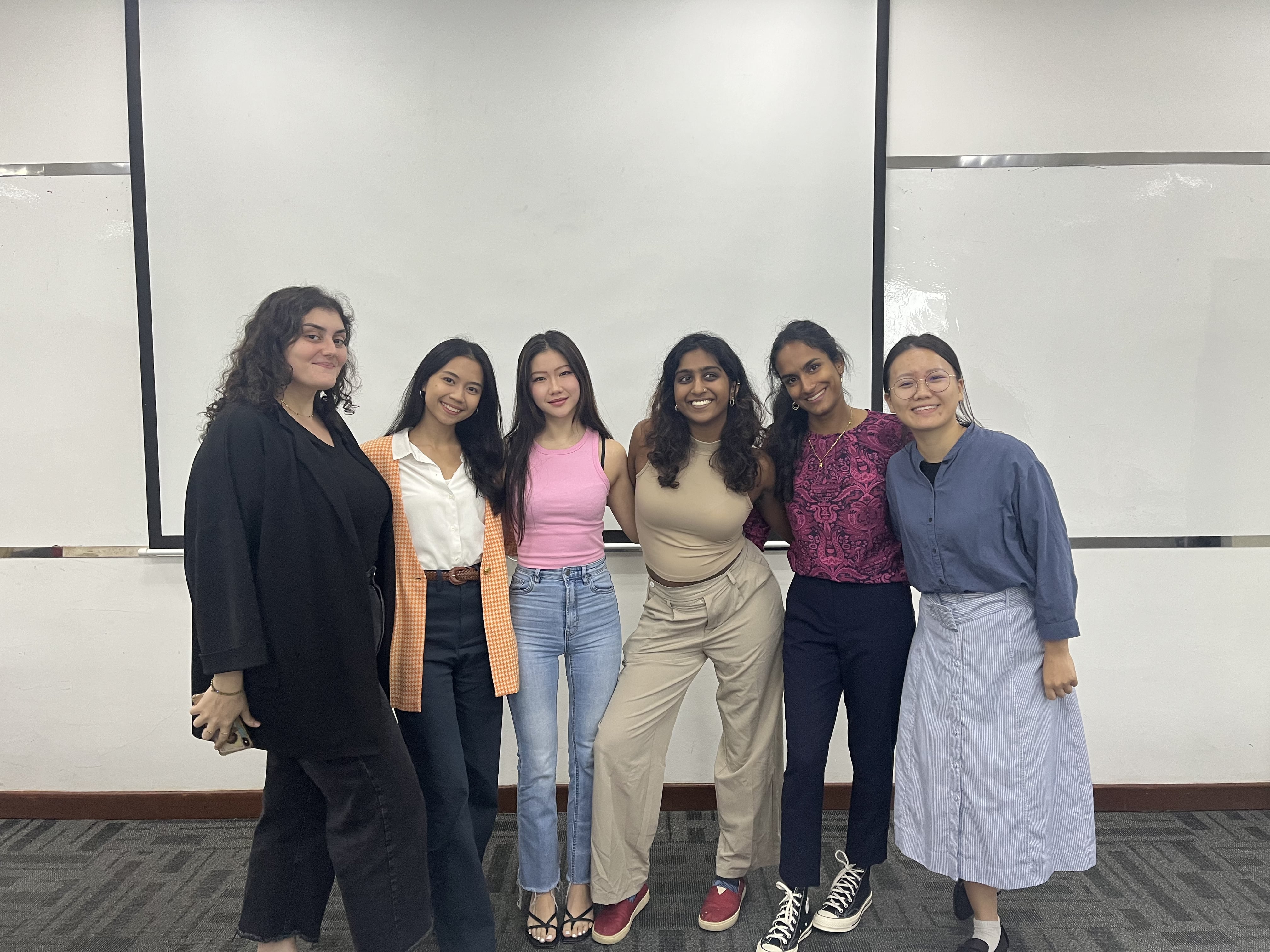
Sixth form deepened that shift. Taking sociology exposed her to the structural realities of inequality. “I suddenly had this epiphany, like, what is happening in this world?” she said. “Learning about gender inequality made me more hyper aware of things I didn’t notice before as a young student.” That mix of curiosity and anger gave her a sense of direction. Politics and international relations felt like the natural path.
She had planned to pursue a scholarship to the United Kingdom, but when that did not work out she took a chance at an education fair. “I had never heard of Nottingham before,” she admitted. “But I saw the booth and thought, you know what, I’ll just fill in the form. I wrote the whole application on the spot.” The University of Nottingham Malaysia offered exactly what she was looking for: International Relations with French, and the possibility of bridging to the UK. It was a split-second decision that would shape the next five years of her life.
Navigating Nottingham: Freedom, COVID, and a Gap Year
Syafina’s first year in Malaysia was a mixture of excitement and unease. She relished the independence of living away from home, but she found herself in an unexpected position: at a university filled with international students, yet with very few Bruneians. “It was the first time being away from home and doing things on my own,” she said. “There was familiarity, but not a sense of home.”
Just as she began to settle, COVID-19 disrupted everything. Classes moved online, and she returned to Brunei. The isolation was difficult, compounded by the cancellation of her planned exchange year to Sciences Po Toulouse. “That really sucked,” she admitted. “I had everything prepared, but I had to cancel.”
By the end of her second year, she chose to take a gap year and pause her studies. What began as a reluctant decision became a turning point. She picked up part-time work as a barista, but her real energy went into volunteering. She joined the ASEAN Youth Advocates Network (AYAN) and began to immerse herself in youth leadership and community projects.
The break opened unexpected doors. In 2022, she and her team secured a USD 7,000 YSEALI grant to run year-long initiatives. Officially, they carried out six main projects and campaigns, but with the series of events and workshops that spun out of each, the number grew to more than a dozen. That same period also marked the launch of the YSEALI fellowship, her first step into a broader regional network. “At first I was scared about taking the gap year,” she reflected. “But looking back, it was one of the best decisions I made. It gave me space to figure out what I really wanted to do, and the friendships I made through volunteering with like-minded people gave me a stronger sense of purpose.”
Returning to Malaysia: Finishing the Degree
After a year away, Syafina returned to Nottingham in Malaysia with a clearer sense of purpose. The gap year had given her confidence and clarity, and she was determined not to waste any more time. She pushed herself to be more open socially, making the effort to connect with classmates and enjoy the community she had missed during lockdowns.
In-person classes brought a new sense of fulfilment. She especially enjoyed language modules, which gave her the interaction and energy she had been craving after months of online lectures. One policy-making module left a lasting mark. She was teamed with an all-female group, and together they decided to highlight women’s issues such as sexual harassment, period poverty, and abortion rights. Their presentation condensed heavy themes into a short but powerful script. “We were able to put so much detail and emotion into it,” she remembered. That script would later evolve into the seed of Demi Gadis.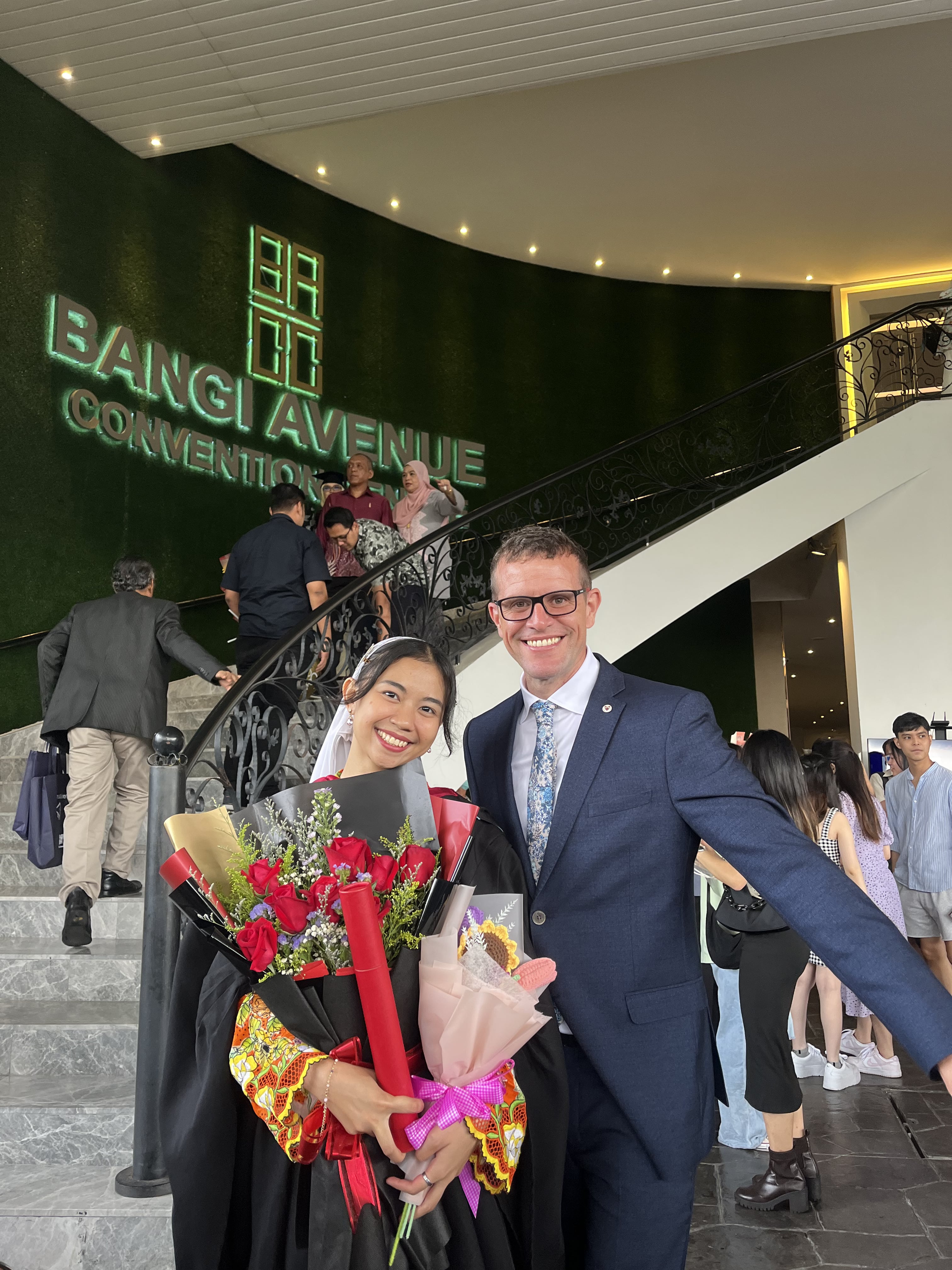
She graduated in 2023, but the moment did not feel like the clean slate she expected. A financial setback and personal struggles at home weighed heavily. Without the safety net of university friends and the routine of campus life, she felt adrift. “Mentally, I wasn’t in the greatest space,” she admitted. The transition into post-university life was her hardest adjustment yet.
From Uncertainty to New Openings
Graduation in 2023 was not the fresh start Syafina had imagined. Personal challenges and a financial scam left her feeling isolated, and the absence of her university friends only deepened the sense of isolation. For a time, the transition into working life felt more like a setback than a step forward.
Yet even during this low point, new opportunities began to emerge. When she sat for the Ministry of Foreign Affairs exam, she found herself competing against thousands of candidates. To her surprise, she advanced to the top twelve. The role did not materialise, but the experience was a reminder of her capability, and rejection soon gave way to unexpected invitations. She was invited to attend the ASEAN–Australian Summit in Melbourne through the Australian High Commission, later travelled to Bali to speak at a youth forum, and over the course of the following year joined around ten fully funded trips across the region. Some were panels where she spoke about youth leadership and gender equality, others were forums and fellowships that widened her network of peers. Each journey offered fresh affirmation that the advocacy work she had once done without pay or recognition was beginning to bear fruit.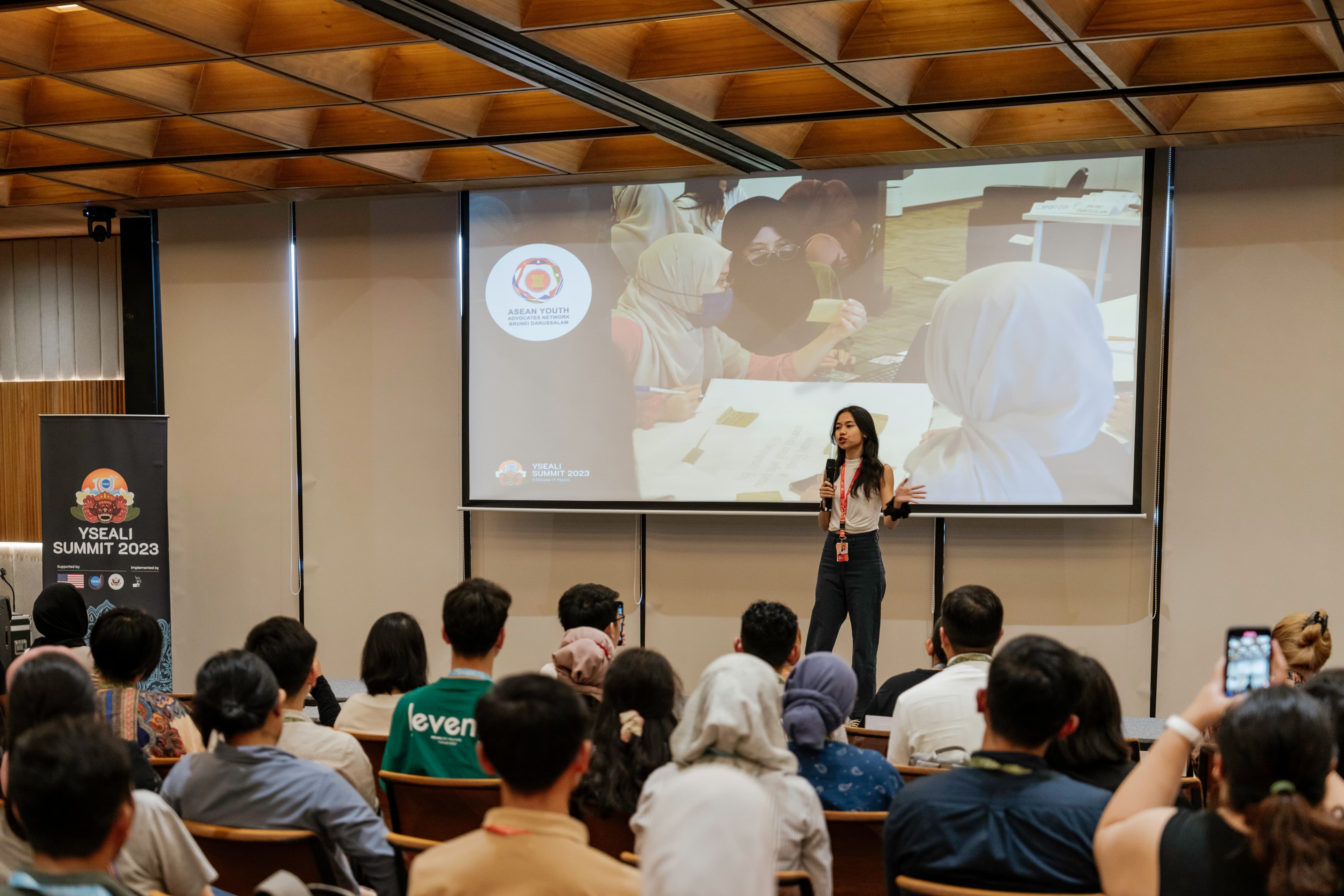
One of the most unusual experiences came through the Ship for Southeast Asian and Japanese Youth Program (SSEAYP), a 28-day regional voyage at sea. With no internet connection for weeks, she found herself reflecting on her future. Midway through the trip, when the ship docked in Vietnam, she regained access to her emails for just a single day. To her surprise, she discovered several interview requests from government ministries. With almost no preparation, she managed to complete two online interviews before the ship departed again. A week later, when the connection returned, she learnt that she had been offered an apprenticeship with the Ministry of Defence. The role allows her to contribute to policy and diplomacy while deepening her expertise in regional and international relations.
By 2025, Syafina was balancing this apprenticeship with her advocacy work. The contrast with her post-graduation slump was striking. What had begun with uncertainty and self-doubt had evolved into a chapter filled with regional engagement, professional growth, and the first steps of building platforms that reflected her deepest values.
Demi Gadis: Building Empathy for Change
Demi Gadis may have begun as a university project, but today it stands as Syafina’s proudest creation. The initiative truly came to life after the YSEALI Summit in 2023, when Syafina met two like-minded peers: one from Malaysia and one from Indonesia. Together, they launched the project across three countries in March 2024, officially unveiling it on International Women’s Day.
At its core, Demi Gadis works toward women’s empowerment. What gives the project its strength is the way it begins with empathy, treating it not just as a value but as a tool for change. By building a culture of listening and understanding, the team creates space for conversations on mental health, healthy relationships, consent, and boundaries, topics often left out of formal education. This approach comes to life most clearly in Empathy on the Move, a UNESCO-supported initiative that brings these lessons into classrooms in ways that are both accessible and practical.
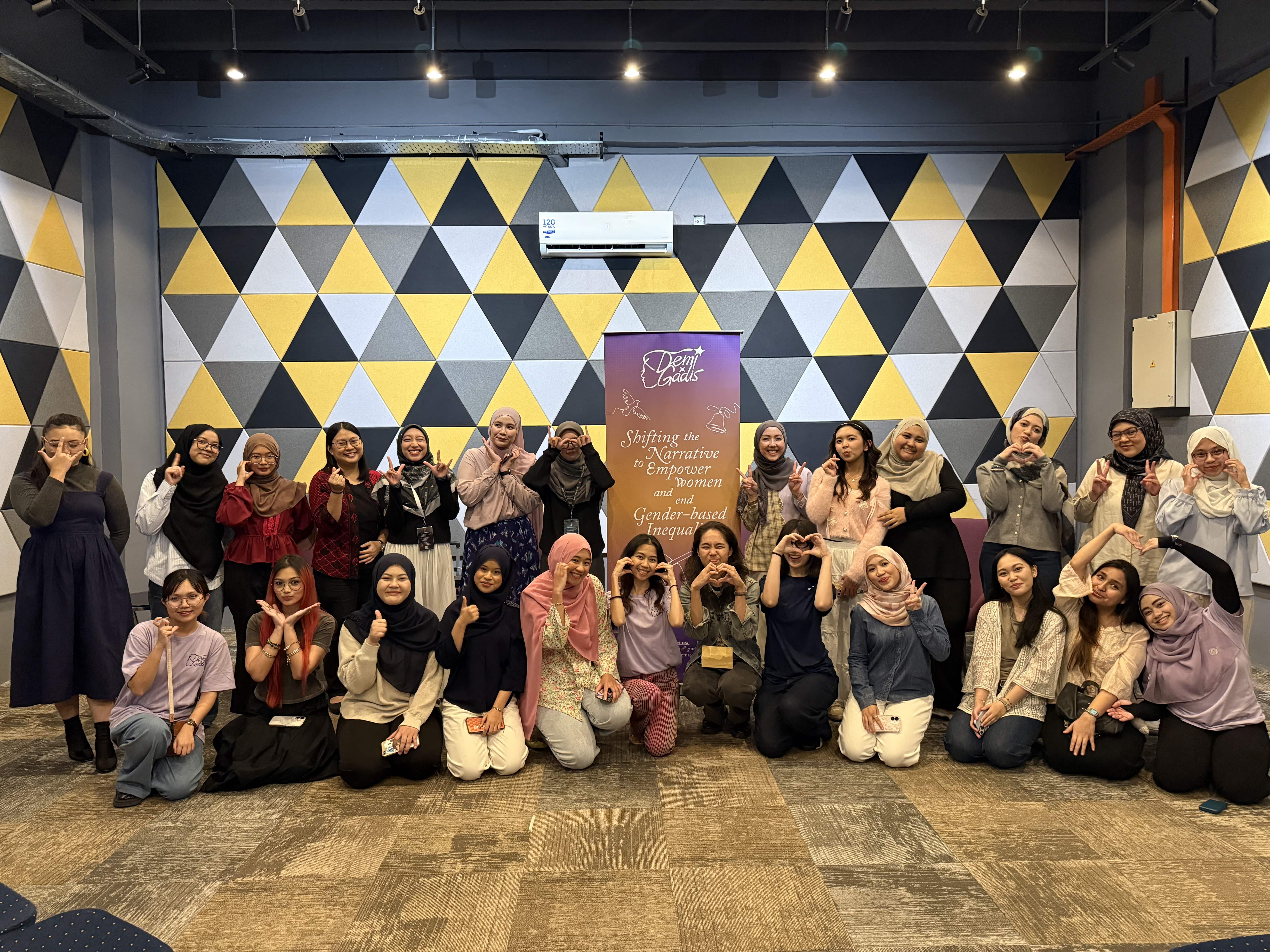
For Syafina, the mission is simple but urgent. “To amplify voices, we first need to build a society that knows how to listen,” she said. By equipping the next generation with empathy and understanding, she believes Demi Gadis can help shift social attitudes in Brunei and beyond.
While resources remain limited and much of the work is shouldered by the team in their own time, the impact is tangible. Each workshop, even when small in scale, becomes a step toward reshaping how communities view equality, well-being, and one another. In that sense, Demi Gadis has grown beyond just a campaign. It is a statement of the kind of society they hope to help build together.
Looking Ahead: Faith, Fulfilment, and Empathy
The contrast between her early post-graduation struggles and her outlook today is telling. Where once she felt panic, she now sees pauses and setbacks as part of the process.
Her ambition is not fixed on a title or a conventional career path. She dreams of expanding Demi Gadis into a sustainable organisation, a social enterprise that continues amplifying unheard voices. Beyond structural growth, she speaks of a quieter hope: to be seen not for accolades, but for the impact she has made. Even if her workshops reach only a handful, she believes in the ripple effect of sparking change in even one life.
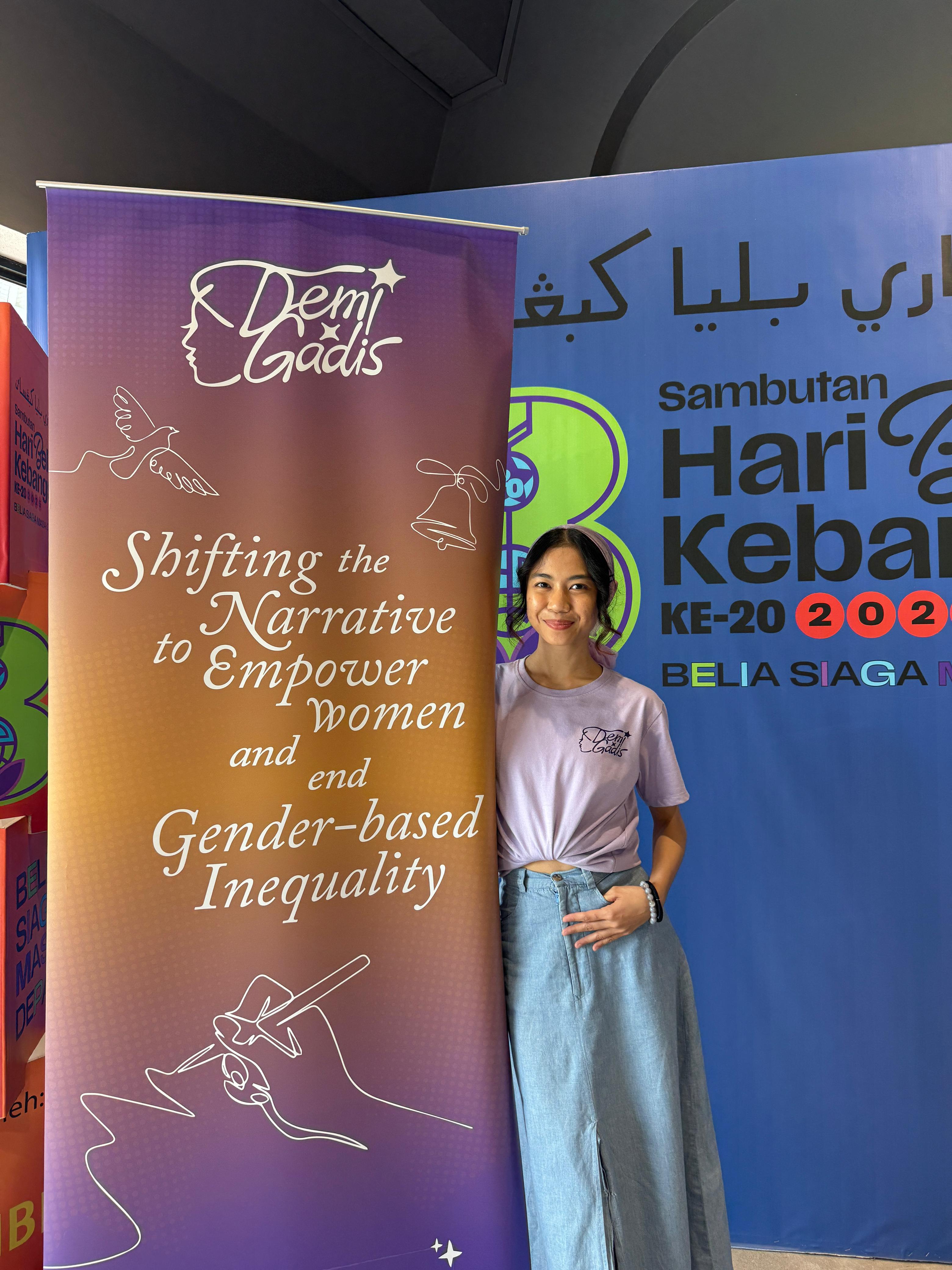
If there is one lesson her story reflects, it is that rejection often becomes redirection. Each detour has opened a path she might never have imagined at the start. And as she continues her journey, she embodies the principle she champions: that even the quietest voices, when nurtured, can change the conversation.
As an imperative closing statement, Syafina extends her gratitude to the author of this article: "Thanks, Ethan, you're rad."



